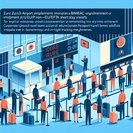
Switzerland’s two-chamber Federal Assembly has passed the first major overhaul of the Federal Act on Foreign Nationals and Integration in more than a decade. In a marathon session that ended in the early hours of 21 November 2025, lawmakers approved a package that (1) introduces annual numerical ceilings for several categories of third-country workers, (2) mandates systematic biometric checks at all land borders, and (3) shortens statutory deadlines for processing asylum claims from 140 to 90 days.
Background and political drivers: 2025 has seen the highest net immigration into Switzerland since the 2007–08 financial crisis, fuelled by labour shortages in health care, construction and IT. At the same time, irregular arrivals along the so-called “Balkan route” have risen sharply, triggering pressure from cantonal authorities that bear the cost of accommodation and social assistance. Centre-right parties argued that the credibility of Switzerland’s humanitarian tradition depends on simultaneously demonstrating control over who can settle and work in the country.
Key measures and how they work:
• 35,000 permits will be available in 2026 for highly-skilled third-country nationals (down from an unlimited regime).
• A new “labour-market test plus” requires employers to show not only that no suitable candidate is available in Switzerland or the EU/EFTA, but also that they have implemented reskilling plans for local staff.
• Border Guard Command (part of the Swiss Customs and Border Security Office) receives CHF 120 million to roll out fixed biometric stations at 11 secondary road crossings with Italy and France, complementing airport EES gates.
• Accelerated asylum: simplified procedures for nationals of five “manifestly safe” countries and digital-only filing to cut paperwork.
![Swiss Parliament Tightens Immigration Rules, Introducing Annual Work-Permit Quotas]()
Business implications: Multinational employers will need to reserve quota slots well in advance and provide stronger evidence of recruitment efforts. In practice, large companies may shift some roles to near-shore EU hubs, while SMEs—particularly in pharma and advanced manufacturing—face longer lead times for bringing in specialists. Global mobility teams should adjust project timelines, update cost projections (legal fees, compliance audits) and revisit talent-pipeline strategies.
Stakeholder reaction: Economiesuisse warned that rigid quotas could undermine Switzerland’s competitiveness, pointing to data showing that 46 % of life-science R&D staff are non-Swiss. Trade unions cautiously welcomed stricter labour-market tests but criticised the lack of extra inspectors to police wage dumping. NGOs such as the Swiss Refugee Council fear that faster asylum procedures may jeopardise due-process guarantees. The Federal Council promised a first impact review by mid-2027.
What’s next: The new law enters into force on 1 January 2026, with implementing ordinances due in the first week of December. Companies should monitor cantonal guidance—especially in Zurich, Basel and Vaud, which together issue more than half of all work permits—to fine-tune application calendars and document templates.
Background and political drivers: 2025 has seen the highest net immigration into Switzerland since the 2007–08 financial crisis, fuelled by labour shortages in health care, construction and IT. At the same time, irregular arrivals along the so-called “Balkan route” have risen sharply, triggering pressure from cantonal authorities that bear the cost of accommodation and social assistance. Centre-right parties argued that the credibility of Switzerland’s humanitarian tradition depends on simultaneously demonstrating control over who can settle and work in the country.
Key measures and how they work:
• 35,000 permits will be available in 2026 for highly-skilled third-country nationals (down from an unlimited regime).
• A new “labour-market test plus” requires employers to show not only that no suitable candidate is available in Switzerland or the EU/EFTA, but also that they have implemented reskilling plans for local staff.
• Border Guard Command (part of the Swiss Customs and Border Security Office) receives CHF 120 million to roll out fixed biometric stations at 11 secondary road crossings with Italy and France, complementing airport EES gates.
• Accelerated asylum: simplified procedures for nationals of five “manifestly safe” countries and digital-only filing to cut paperwork.

Business implications: Multinational employers will need to reserve quota slots well in advance and provide stronger evidence of recruitment efforts. In practice, large companies may shift some roles to near-shore EU hubs, while SMEs—particularly in pharma and advanced manufacturing—face longer lead times for bringing in specialists. Global mobility teams should adjust project timelines, update cost projections (legal fees, compliance audits) and revisit talent-pipeline strategies.
Stakeholder reaction: Economiesuisse warned that rigid quotas could undermine Switzerland’s competitiveness, pointing to data showing that 46 % of life-science R&D staff are non-Swiss. Trade unions cautiously welcomed stricter labour-market tests but criticised the lack of extra inspectors to police wage dumping. NGOs such as the Swiss Refugee Council fear that faster asylum procedures may jeopardise due-process guarantees. The Federal Council promised a first impact review by mid-2027.
What’s next: The new law enters into force on 1 January 2026, with implementing ordinances due in the first week of December. Companies should monitor cantonal guidance—especially in Zurich, Basel and Vaud, which together issue more than half of all work permits—to fine-tune application calendars and document templates.









